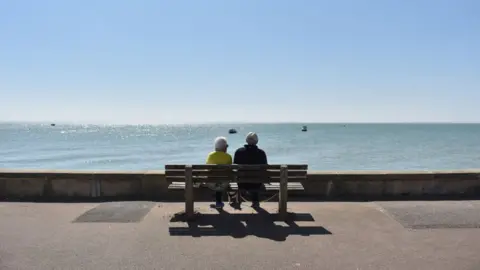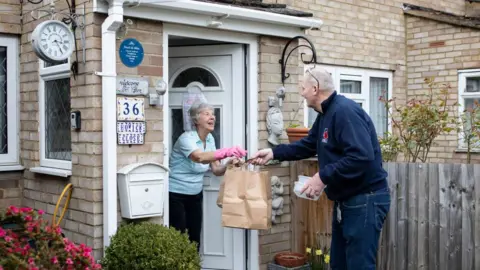Coronavirus: What are the lockdown rules for the over-70s?
 Getty Images
Getty ImagesThe government considers people over 70 to be at greater risk of having severe cases of Covid-19 than the rest of the population.
There has been speculation that this means the current restrictions may be relaxed more slowly on older people than the rest of the population.
But Sunday's announcement of how lockdown rules could be relaxed in the coming months in England from Prime Minister Boris Johnson did not distinguish between different age groups.
There has been no specific announcements in recent days regarding over 70s in Scotland, Wales or Northern Ireland.
There are about nine million people over 70 in the UK, which is about 14% of the population.
What is the advice for the over-70s?
The government's rules for the lockdown identified groups of "clinically vulnerable" people who should take particular care to minimise contact with anyone outside their household.
They included those aged 70 or over, "regardless of medical conditions".
At the moment, the rules for this group are not different, so they are allowed out to take exercise or can leave their homes to go to work if they cannot work from home, but they are strongly advised to "take particular care".
This group is different from those who are defined as being "clinically extremely vulnerable". That group should be taking "shielding" measures, and include people with particular cancers and severe respiratory conditions such as cystic fibrosis.
People in this more at-risk group should have received a letter from their GP, and the measures that they are supposed to take are more severe, including not leaving their homes at all and remaining in lockdown until at least the end of June.
 Dan Kitwood
Dan KitwoodWhy is the advice different?
The government is right to say people over the age of 70 are more likely than younger people to have severe cases of Covid-19.
In the ONS figures up to 24 April, 81.5% of the deaths in England and Wales for which the virus had been mentioned on the death certificate were for people aged over 70.
The risk is particularly stark for those aged over 85. While 262 out of 100,000 people between 75 and 84 have died with Covid-19 mentioned on their death certificates, the figure for over-85s is 718 per 100,000.
But should we be very surprised by this? In a normal year, about 82% of all deaths are people aged over 70, so the proportion of deaths due to coronavirus is much the same as the proportion of deaths overall.
By asking the over-70s, who were most likely to need hospital treatment, to be extra careful, the government hoped to prevent the NHS being overwhelmed.


- A SIMPLE GUIDE: How do I protect myself?
- AVOIDING CONTACT: The rules on self-isolation and exercise
- WHAT WE DON'T KNOW How to understand the death toll
- TESTING: Can I get tested for coronavirus?
- LOOK-UP TOOL: Check cases in your area

Will lockdown be eased for healthy over-70s?
There was much confusion early in the outbreak as to whether people aged over 70 would be asked to self-isolate for longer than the rest of the population, even if they were in good health.
At the moment, government policy is that healthy over-70s are being asked to be extra careful about following the rules, but are not being shielded in the way that people with certain health conditions are.
But a report from academics in London and Edinburgh suggested that a way to lift lockdown restrictions on most of the population would be to exclude older and vulnerable people from the relaxation of the rules.
Asked whether people over 70 would be treated as a single group when lockdown restrictions are eased, Health Secretary Matt Hancock said: "I can assure people that the shielding measures, which are going to have to go on for some time, they are not blanket measures and they do not apply to all over-70s."
This is in contrast with the Republic of Ireland, where over-70s were not allowed to leave their homes at all until the rules were relaxed last week.
There have been objections to the possibility of healthy over-70s being denied the easing of lockdown restrictions.
The British Medical Association said any exceptions to the easing of lockdown should be on the basis of the need to protect individuals and that quarantining people "based solely on age would be both unethical and illegal".
